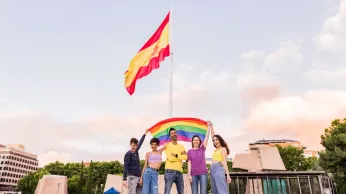
4 hours ago
From Exile to Empowerment: Queer Russians Forge New Lives in Spain Amid Rising Repression
READ TIME: 3 MIN.
The past year has witnessed a dramatic escalation in Russia’s anti-queer policies. Following the Supreme Court’s decision in November 2023 to designate the “international LGBT movement” as an “extremist organization,” Russian courts have issued over 100 convictions for individuals participating in or supporting queer causes. This ruling has forced many support organizations to shut down or operate clandestinely, leaving queer Russians vulnerable to surveillance, harassment, and prosecution.
According to Coming Out and Sphere, two leading Russian queer rights organizations, there has been a substantial rise in requests for emergency assistance, visas, and asylum applications since the Supreme Court rulingwhich has made daily life dangerous for queer Russians, prompting many to seek new homes abroad.
Spain has emerged as a critical refuge for queer Russians fleeing persecution. Known for its strong legal protections and inclusive stance on human rights, the country has seen a surge in asylum applications from Russian citizens, rising from 684 in 2022 to 1,694 in 2023. The increase reflects both the severity of repression in Russia and Spain’s reputation as a welcoming destination.
However, the transition is fraught with bureaucratic obstacles. The asylum process is slow, and a new visa requirement for transit introduced in July 2024 has complicated access for many. Applicants face lengthy waits, uncertainty about legal status, and—despite Spain’s progressive laws—occasional setbacks when residency requests are denied. For instance, a group of 65 Russian dissidents, including queer individuals, have found themselves in legal limbo after Spanish authorities failed to follow through on promises of fast-track residency, leaving some without approved applications or facing outright rejection.
Among those seeking refuge are Diana and Ilia Andreev, who left Russia after authorities targeted queer activists and banned public expressions of queer identity. Diana, previously involved in underground queer organizing, recalls, “We had nowhere left to meet, nowhere left to be ourselves. Spain felt like our only chance for freedom.”
Upon arrival, many queer Russian exiles face the daunting task of rebuilding their lives from scratch. Language barriers, limited financial resources, and the uncertainty of the asylum process are common challenges. Yet, Spain’s vibrant queer community provides vital support. Organizations such as FELGTBI+ (Federación Estatal de Lesbianas, Gais, Trans, Bisexuales, Intersexuales y más) offer legal advice, housing assistance, and opportunities for social connection (FELGTBI+, https://felgtbi.org/).
“Spain is not perfect, but here I can walk hand in hand with my partner and not fear the police,” said Ilia, who has begun volunteering with local LGBTQ+ advocacy groups. Many exiles find solidarity in Madrid and Barcelona’s queer neighborhoods, participating in Pride events and support circles. These communities offer a sense of belonging and a platform for activism—a stark contrast to the clandestine networks of Russia.
Despite Spain’s overall welcoming stance, the asylum process remains a source of anxiety. Some applicants, including prominent activists, have had their humanitarian residence requests denied. Spanish officials argue that not all face “proven risk” if forced to return, even as Moscow intensifies its crackdown on dissent.
Advocates highlight the dangers of such rejections, noting that queer Russians returning home may face criminal charges, social ostracism, or violence. The Free Russia Foundation, a U.S.-based pro-democracy group, continues to coordinate with Spanish authorities to facilitate safe relocation for those at risk.
“Spain and other European countries must recognize the real and present danger faced by LGBTQ+ Russians,” said a spokesperson for Sphere, one of the organizations monitoring the situation.
For many queer Russian exiles, the journey to Spain is not merely an escape but the start of a new chapter. While legal limbo and bureaucratic hurdles persist, the ability to live authentically, participate in community, and advocate for rights is transformative.
Spain’s annual Pride celebrations, inclusive workplaces, and public support for queer rights have empowered exiles to share their stories and advocate for change. Some have launched online networks and storytelling projects, amplifying the voices of queer Russians in diaspora and connecting those still at risk inside Russia (Instagram: @QueerRussiansInSpain).
“We’re not just surviving—we’re living, loving, and building something new,” said Diana at a recent community meeting in Madrid. “That is a victory in itself.”






